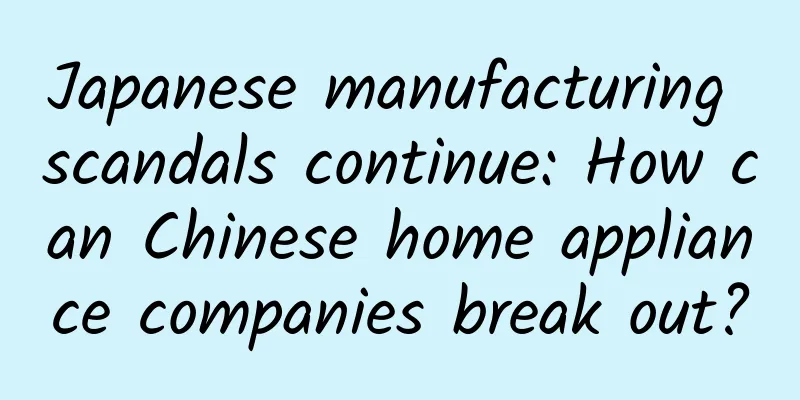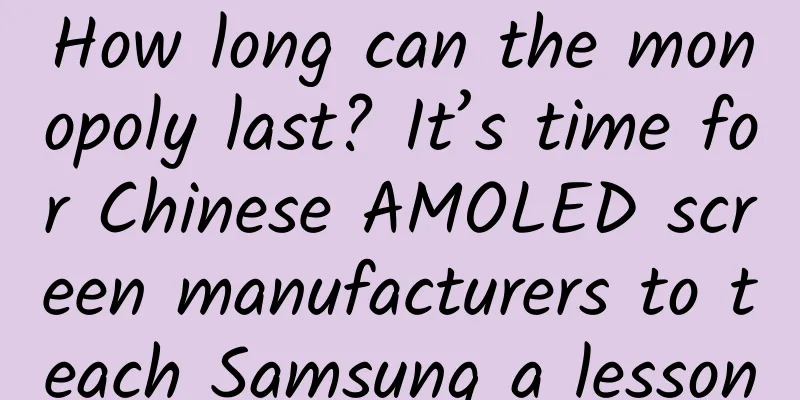Japanese manufacturing scandals continue: How can Chinese home appliance companies break out?

|
Once upon a time, Japanese manufacturing was synonymous with refinement and rigor in the minds of Chinese and even global people. However, recently, Japanese manufacturing has "encountered an earthquake". One after another, fraud secrets have been exposed... The company involved happened to be a century-old company, and the fraud had started 10 years ago... Kobe Steel, Japan's third largest steel company, admitted to data fraud in early October. Last week, Subaru was also caught up in the "inspection scandal". In June this year, Japan's Takata filed for bankruptcy protection. The world's largest airbag manufacturer was forced to recall millions of cars by Volkswagen, General Motors and other automakers due to safety hazards in its airbags. In April last year, Mitsubishi Motors broke out the "fuel efficiency scandal". After a media investigation, the company admitted that it had falsified the fuel consumption data of many of its cars. This fraud has been going on for 25 years. The Made in Japan scandal has taught Chinese home appliance companies three lessons. For all Chinese home appliance companies, they should not be complacent: instead of paying attention to the frequent Made in Japan scandals with a mentality of watching the fun, they should prepare for the rainy day and sort out the unresolved weaknesses in the development process over the past 30 years and wait for opportunities to break through. In the past decade or so, facing the continuous impact of the Internet wave, a large number of Japanese companies in the traditional manufacturing industry have long been trapped in the channel of "declining volume and declining profits, and a confused future", but have not found a way to save themselves, and have to resort to the expedient measure of fraud. What is really terrifying is the Japanese corporate management team hidden behind the fraud, and a rigid organization and system that is heading towards its end. Many Chinese home appliance companies, which currently have a staff size of around 100,000, are facing many challenges in operation and management, such as inconsistent values, increasingly poor execution, increasingly weaker flexibility in dealing with market competition, and the entire organization being "boiled like a frog in warm water". How to get rid of the big enterprise disease and strengthen the strength while expanding the scale of the enterprise is exactly the problem that the current home appliance giants with a market value of hundreds of billions must solve, and it is also a problem that a large number of small and medium-sized enterprises need to solve after rapidly expanding their scale and market value. As a winner of Toutiao's Qingyun Plan and Baijiahao's Bai+ Plan, the 2019 Baidu Digital Author of the Year, the Baijiahao's Most Popular Author in the Technology Field, the 2019 Sogou Technology and Culture Author, and the 2021 Baijiahao Quarterly Influential Creator, he has won many awards, including the 2013 Sohu Best Industry Media Person, the 2015 China New Media Entrepreneurship Competition Beijing Third Place, the 2015 Guangmang Experience Award, the 2015 China New Media Entrepreneurship Competition Finals Third Place, and the 2018 Baidu Dynamic Annual Powerful Celebrity. |
Recommend
The former battery giant is in trouble: Watma suspends production to reorganize, BYD is busy with losses and changes
Recently, a news that all employees of Shenzhen W...
When a person dies, is the body completely dead? Some genes are still trying to revive the human body
Death represents the end, because everything we h...
Domestic Tesla was exposed to have secretly reduced its configuration. The official response said that it would upgrade related accessories for consumers free of charge
As Tesla's Shanghai Super Factory gradually r...
Japanese media: Volvo Cars may recruit new shareholders other than Geely
Japanese media reported that Swedish luxury car c...
Beware! These “social gadgets” carry hidden risks, and many children are using them!
You can add friends by tapping, chat, take photos...
Tears on the Great Wall, moved from GitHub to GitCafe
GitHub Blog Migration Guide Recently I have found...
Soaking the server in water turns out to be for... | Digital Literacy
Audit expert: Zheng Yuanpan Professor of Zhengzho...
What does the "Guang" in Guangdong and Guangxi refer to?
We all know that the "He" in Henan and ...
In-depth study of Android Dalvik's Dex file format
Case Studies In this case study, we will examine ...
Android Annotations Quick Start and Practical Analysis
First of all, what is an annotation? @Override is...
AI football coach qualified? Drawing tactics is better than human coaches! It can also "master" other sports
Football is the most popular, most accepted and m...
Introduction to Dong Zhongshu: How to increase the amount of external links?
How to post external links to increase the entry ...
What is it like to fall in love with AI? Netizens: It's too addictive!
Recently, a blogger on a social platform posted a...
In the future, this material will be used to build houses, which will be warm in winter and cool in summer without air conditioning.
Produced by: Science Popularization China Produce...
They give free chickens to residents to solve the problem of kitchen waste | Environmental Trumpet
Hello everyone, this is the 31st issue of the Env...









